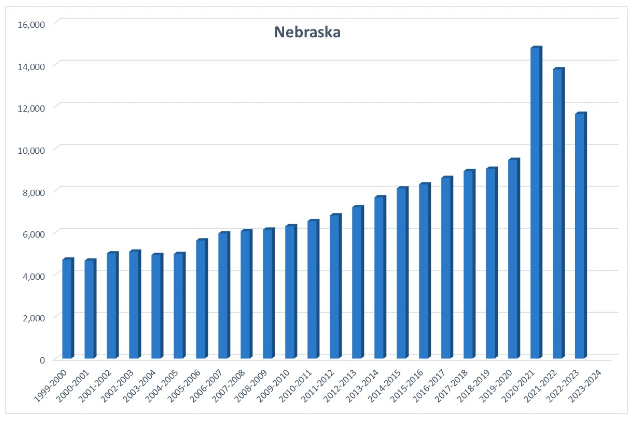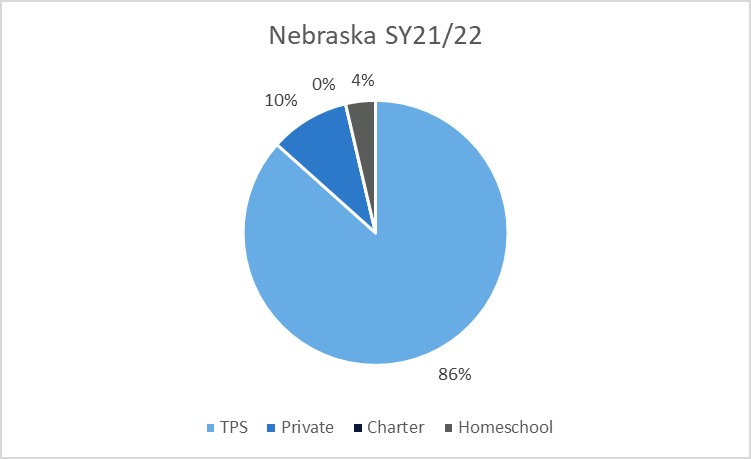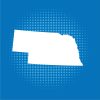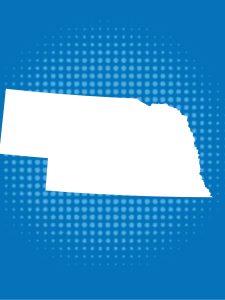Nebraska is another state (like Wisconsin) where some virtual or online schools are considered homeschooling. The state also requires a copy of the student’s birth certificate to homeschool.
History
Nebraska, located in the midwestern United States, legalized homeschooling in 1984 and most recently updated its laws in 2021. In Nebraska, homeschools are considered exempt schools and are private but nonaccredited (by the state) schools.
Regulation
Nebraska requires parents who homeschool their children, ages 6 to 18, to notify the state of their exemption status under “Rule 13.” annually. Homeschooled students in Nebraska must receive a minimum of 1,080 to 1,032 hours of instruction (depending on grade level.) There is no minimum education requirement for “instructional monitors,” but the state does ask for their names, ages, and highest levels of education. While the state requires instruction in core subjects, there are no curriculum or testing requisites. There is an immunization requirement for homeschooled students, with a religious exemption option.
Homeschooled students have unfunded access to public school offerings like sports, courses, and extracurricular activities. Local districts set their policies on part-time enrollment. Part-time students must be enrolled in at least five credit hours to play sports. Access is more restricted for nonpublic students who are not homeschooled. Homeschooled students with special needs are not explicitly eligible for special services at their local public schools and should contact their local schools for more information.
State Data
Homeschool participation has increased steadily over the last two decades. For example, over 4,500 students reported homeschooling in 2000, which increased to over 14,500 at the height of the pandemic. Nebraska also reports disaggregated homeschool participation information by district and county and provides a more detailed look at state trends.

Similarly, U.S. Census estimates indicate that around 3.0% of Nebraska families homeschooled in the spring of 2020 and increased to 6.5% by the fall of 2020. Note that these percentages reflect family participation and are low compared to the national averages of 5.4% and 11.1%, respectively. In the 2022 and 2023 school years, U.S. Census estimates indicate that 3.3% of all K-12 students, on average, in Nebraska were homeschooled.
Cross-Sector Comparison
During the 2019-20 academic year, 2.5% of Nebraska’s K-12 students were homeschooled. Homeschool participation in the state was much lower than the 9.5% of students attending private schools. In 2021-22, 3.6% of Nebraska’s K-12 students were homeschooled, and 9.7% of students attended private schools.

School Choice Context
In addition to homeschooling, parents in Nebraska have some educational choices available. These options include open enrollment in traditional public schools and magnet schools. Nebraska is one of just a few states with no charter schools. The state also has a new tax credit scholarship, passed in 2023 and set to launch in 2024. However, the Opportunity Scholarship Act does not include homeschooled students.
Commentary
Nebraska could further improve transparency by publicly reporting more of the information it already collects from homeschooled families. For example, providing parental education and age information would further inform the understanding of homeschool trends in the state and the nation.

-
3% Families
Around 3% of families in Nebraska homeschooled prior to the pandemic.
-
1984 Legalized
Homeschooling was legalized in 1984 in the state of Nebraska.
-

-
More Information
3% Families
Around 3% of families in Nebraska homeschooled prior to the pandemic.
1984 Legalized
Homeschooling was legalized in 1984 in the state of Nebraska.

More Information
Last updated December 2023.